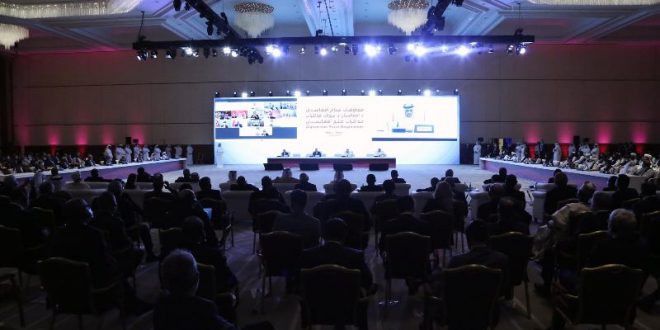Dr. Abdullah seeks ceasefire, a lasting peace
‘Washington won’t allow Afghanistan to become a terrorist sanctuary’
China calls for a ‘responsible’ withdrawal of foreign troops from Afghanistan
Taliban free 22 government prisoners on anvil of talks
World looks on for a political settlement through dialogue
By Mansoor Faizy
KABUL: With an unprecedented international support, Afghanistan government officially started peace talks with the Taliban on Saturday in Doha to reach peace after 19 years of conflict.
Intra-Afghan peace talks began after painstaking months of negotiations between Washington and Taliban, setting motion to a prisoner swap between Kabul government and militants. The lengthy exchange of prisoners put Kabul government on a tight spot as it construed it as an act of relenting to a deal it never was part of. Nevertheless, the government released 6,300 prisoners, removing all barriers to peace talks.
As talks began, Taliban freed 22 Afghan forces in Helmand as a goodwill gesture.
In his opening remarks, Dr. Abdullah Abdullah called for ceasefire and a dignified lasting peace which will protect Afghanistan’s “independence, freedom, national sovereignty, territorial integrity and inclusive political participation”. Regardless of which side of the negotiation we belong to, we must act as a one united nation, said head of High Council of National Reconciliation addressing the first-ever direct talks with the Taliban in Qatar.

Pompeo met separately with Taliban’s second-in-command Mullah Ghani Baradar and Afghan leader Dr. Abdullah.
Taliban Deputy Leader Mullah Abdul Ghani Baradar addresses the opening ceremony of the intra-Afghan negotiations in Doha. He welcomed Kabul peace delegation to Qatar.
The inter-Afghan negotiating teams should be enthusiastic to conduct their discussions in the light of the values of the sacred religion of Islam on the important issues of the country, he added.

U.S. Secretary of State Mike Pompeo, who earlier said Doha peace talks will be contentious, urged both sides of the talks to be patient and seize the opportunity for peace. “Taliban must seize this opportunity to forge a political settlement and reach a comprehensive and permanent ceasefire to end 40 years of war. This effort must be Afghan led,” he said.
As the U.S. is preparing to leave Afghanistan, Washington is pursuing a policy of conciliation with Taliban. But, Pompeo ruled out any U.S. plans to impose a certain system of governance on Afghanistan. This is as U.S. President Donald Trump’s administration has long pledged to pull out troops from Afghanistan with a planned withdrawal of thousands by November.
In his address, Chinese Foreign Minister Wang Yi welcomed peace negotiations between Afghans and called for the withdrawal of foreign troops from Afghanistan “in a responsible way”.
Back in February, the U.S. and the Taliban reached a peace deal to enable the Afghan government to meet directly with insurgents for dialogue. In return for a U.S. military drawdown, the Taliban guaranteed Washington to break ties with terrorist networks. Pompeo reiterated that the U.S. “won’t allow al-Qaeda and other groups to use Afghan soil and Afghanistan to turn into a safe havens for them.”
Since the Taliban were ousted from power in 2001 and a democratic government was established, Afghanistan has now a lot at stake and negotiating with insurgents will have to ensure a continuity of republic government, constitutional amendment, civil liberties, elections, women’s rights. With the fate of Afghanistan hanging in the balance, Doha peace talks would be a testing ground for both Kabul and Taliban to try to find a compromise. With the Taliban pushing for an emirate-style theocratic governance, it would be difficult to convince the insurgents to accept a democratic republic government.
NATO Secretary General Jens Stoltenberg in his address said the peace talks must preserve Afghanistan’s gains and maintain peace after decades of conflict.
Foreign ministers and high-ranking officials from Spain, India, Russia, UK, Pakistan, China, Japan and many other countries addressed the opening ceremony of the Afghan peace negotiations in Doha, calling for a political settlement and an end to war in peace negotiations led and owned by the Afghan people which will guarantee Afghanistan’s independence, rights of minorities and women.
Uzbekistan’s Foreign Minister Abdulaziz Kamilov even offered to host talks between the Afghans.
Pakistan’s Foreign Minister Shah Mahmood Qureshi said it was up to Afghans to decide on their fate. He argued that past mistakes should not be repeated and the Afghan people should not be left alone.
Mansoor Faizy is the Editor-in-Chief of Afghanistan Times Daily.
 Afghanistan Times
Afghanistan Times




